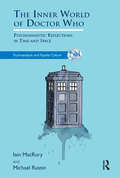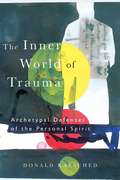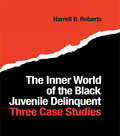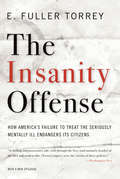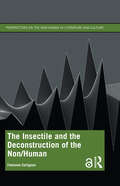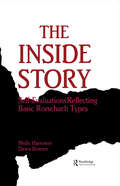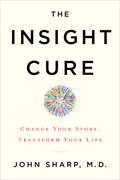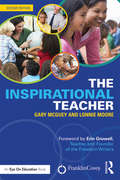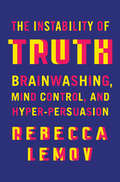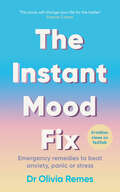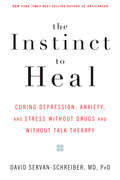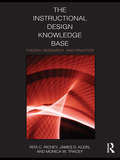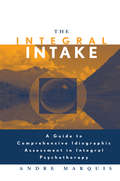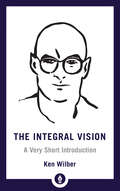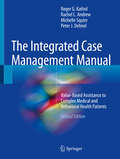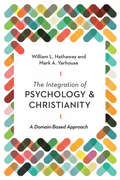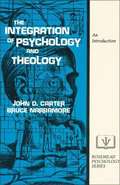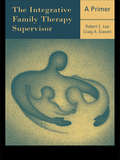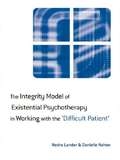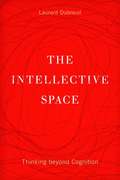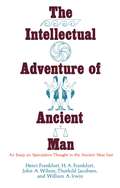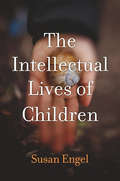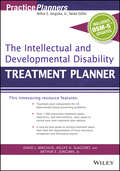- Table View
- List View
The Inner World of Doctor Who: Psychoanalytic Reflections in Time and Space (The\psychoanalysis And Popular Culture Ser.)
by Michael Rustin Iain MacRuryAs Doctor Who approaches its fiftieth anniversary recent series have taken the show to new heights in terms of popular appeal and critical acclaim.The Doctor and his TARDIS-driven adventures, along with companions and iconic monsters, are now recognised and enjoyed globally. The time is ripe for a detailed analytic assessment of this cultural phenomenon. Focussing on the most recent television output The Inner World of Doctor Who examines why the show continues to fascinate contemporary audiences. Presenting closely-observed psychoanalytic readings of selected episodes, this book examines why these stories of time travel, monsters, and complex human relationships have been successful in providing such an emotionally rich dramatization of human experience. The Inner World of Doctor Who seeks to explore the multiple cultural and emotional dimensions of the series, moving back and forth from behind the famous sofa, where children remember hiding from scary monsters, and onto the proverbial psychoanalytic couch.
The Inner World of Trauma: Archetypal Defences of the Personal Spirit
by Donald KalschedDonald Kalsched explores the interior world of dream and fantasy images encountered in therapy with people who have suffered unbearable life experiences. He shows how, in an ironical twist of psychical life, the very images which are generated to defend the self can become malevolent and destructive, resulting in further trauma for the person. Why and how this happens are the questions the book sets out to answer. Drawing on detailed clinical material, the author gives special attention to the problems of addiction and psychosomatic disorder, as well as the broad topic of dissociation and its treatment. By focusing on the archaic and primitive defenses of the self he connects Jungian theory and practice with contemporary object relations theory and dissociation theory. At the same time, he shows how a Jungian understanding of the universal images of myth and folklore can illuminate treatment of the traumatised patient. Trauma is about the rupture of those developmental transitions that make life worth living. Donald Kalsched sees this as a spiritual problem as well as a psychological one and in The Inner World of Trauma he provides a compelling insight into how an inner self-care system tries to save the personal spirit.
The Inner World of the Black Juvenile Delinquent: Three Case Studies
by Harrell B. RobertsFirst published in 1987. Routledge is an imprint of Taylor & Francis, an informa company.
The Insanity Offense: How America's Failure to Treat the Seriously Mentally Ill Endangers Its Citizens
by E. Fuller Torrey"Vital for all working in the mental health field . . . . Fascinating reading for anyone." --Choice E. Fuller Torrey, the author of the definitive guides to schizophrenia and manic depression, chronicles a disastrous swing in the balance of civil rights that has resulted in numerous violent episodes and left a vulnerable population of mentally ill people homeless and victimized. Interweaving in-depth accounts of landmark cases in California, Wisconsin, and North Carolina with a history of legislation and changes in the mental health care system, Torrey gives shape to the magnitude of our failure and outlines what needs to be done to reverse this ongoing--and accelerating--disaster. A new epilogue on the 2011 shooting in Tucson, Arizona, brings this tragic story up to date.
The Insectile and the Deconstruction of the Non/Human (Perspectives on the Non-Human in Literature and Culture)
by Fabienne CollignonThe Insectile and the Deconstruction of the Non/Human defines, conceptualizes, and evaluates the insectile—pertaining to an entomological fascination—in relation to subject formation. The book is driven by a central dynamic between form and formlessness, further staging an investigation of the phenomenon of fascination using Lacanian psychoanalysis, suggesting that the psychodrama of subject formation plays itself out entomologically. The book’s engagement with the insectile—its enactments, cultural dreamwork, fantasy transformations—‘in-forming’ the so-called human subject undertakes a broader deconstruction of said subject and demonstrates the foundational but occluded role of the insectile in subject formation. It tracks the insectile across the archives of psychoanalysis, seventeenth century still life painting, novels from the nineteenth century to the present day, and post-1970s film. The Insectile and the Deconstruction of the Non/Human will be of interest for scholars, graduate students, and upper-level undergraduates in film studies, visual culture, popular culture, cultural and literary studies, comparative literature, and critical theory, offering the insectile as new category for theoretical thought.
The Inside Scoop on Eating Disorder Recovery: Advice from Two Therapists Who Have Been There
by Colleen Reichmann Jennifer RollinThe Inside Scoop on Eating Disorder Recovery is a fresh, smart, how-to book that helps people with eating disorders to heal their relationship with food, their bodies, and ultimately themselves. Written from the perspective of two eating disorder therapists, both of whom are recovered from their own eating disorders, the text uses humor, personal narratives, and research-proven techniques to offer specific actionable guidelines on how to reclaim one’s life from an eating disorder. The authors explain the difference between dieting and eating disorders, break down the stages of recovery, and provide tips on how to thrive in each stage. The book provides powerful myth-busting on topics that have historically not been addressed in eating disorder recovery books, such as clean eating and orthorexia, exercising in recovery, and fat positivity. Tangible exercises at the end of each chapter provide readers with advice and tips on implementing this approach to recovery in their day-to-day lives. The humorous and down-to-earth tone of the book creates an authentic and genuine feel that leaves those who struggle with chronic dieting, eating disorders, and negative body image feeling connected and heard.
The Inside Story: Self-evaluations Reflecting Basic Rorschach Types (Personality Assessment Series)
by Molly Harrower Dawn BowersThis unusual book was written to provide a glimpse into the inner "Rorschach" world of individuals -- psychology students in training -- representing the basic Rorschach subtypes. The Rorschach records of these graduate students in clinical psychology are presented along with their own interpretations and analyses of their records. In short, The Inside Story offers both a new approach to learning projective diagnostic methods such as the Rorschach and a new experience in the adventure of self-understanding.
The Inside Story: Understanding the Power of Feelings
by The Editors at HeartMathWith exercises in each chapter, the book explores our 3 brains and how they produce our emotions.
The Insight Cure: Change Your Story, Transform Your Life
by John SharpEvery person has a story, a personal narrative that informs their life, their decisions, and their way of thinking. But did you know that it also affects the wiring of your brain? <P><P>Renowned psychiatrist and professor at Harvard Medical School John Sharp, M.D., offers an eight-step process to discovering your unconscious narrative and using your new insight to eradicate the "false truth" that has been at the core of your self-sabotage. His unique approach integrates four core domains of applied psychology—control mastery theory, attachment theory, narrative therapy, and positive psychology—with his own research and professional experience to construct an insightful and soul-searching path to insight. <P><P>Dr. Sharp’s approach is simple and accessible, with the power to wield profound results. Through exercises, quizzes, thorough exploration of case studies, and clear guidance, you will be able to find your false truth, rewrite your story, and transform your life. Once you have flipped the switch of insight, nothing can hold back the light that shines from within.
The Inspirational Teacher
by Gary McGuey Lonnie MooreBecome a teacher who truly inspires students to learn and grow! This bestselling book—from Routledge and Franklin Covey, the company that brought you The 7 Habits of Highly Effective People—is filled with practical and heartfelt advice that will resonate with teachers at all stages of their careers. The book will guide you through a simple four step process to building high-trust relationships and unleashing the greatness within all students. This timely new edition includes updated references and inspirational quotes throughout, as well as chapter reflection questions to help you make the most of what you read. In addition, several of the questionnaires and reflection tools from the book are also available on our website as free eResources, so that you can easily print and use them in your own classroom. http://www.routledge.com/books/details/9781138906242.
The Instability of Truth: Brainwashing, Mind Control, and Hyper-Persuasion
by Rebecca LemovAn acclaimed historian of science uncovers the hidden history of brainwashing—and its troubling implications for today. Because brainwashing affects both the world and our observation of the world, we often don’t recognize it while it’s happening—unless we know where to look. As Rebecca Lemov writes in The Instability of Truth, “Brainwashing erases itself.” What we call brainwashing is more common than we think; it is not so much what happens to other people as what can happen to anyone. The Instability of Truth exposes the myriad ways our minds can be controlled against our will, from the brainwashing techniques used against American POWs in North Korea to the “soft” brainwashing of social media doomscrolling and behavior-shaping. In our increasingly data-driven world, anyone can fall victim to mind control. Lemov identifies invasive forms of emotional engineering that exploit trauma and addiction to coerce and persuade in everyday life. Tracing the word “brainwashing” from deep in the files of an operative of the U.S. Office of Strategic Services in the 1950s to the pioneering research of Robert Jay Lifton, to the public trials of cult leaders and the case of Patty Hearst, Lemov also studies how the idea of mind control has spread across the globe and penetrated courtrooms, secret labs, military schools, and today’s digital sites. The Instability of Truth offers lessons from mind-control episodes past and present. Truth is always subject to question in more mundane walks of life than most people believe, and Lemov equips us for the increasing challenges we face from social media, AI, and an unprecedented, global form of surveillance capitalism. The Instability of Truth develops a rigorous new understanding of both brainwashing’s paradoxes and its emotional roots, by giving voice to brainwashers, the brainwashed, and third-party observers alike.
The Instant Mood Fix: Emergency Remedies to Beat Anxiety, Panic or Stress
by Olivia Remes50 simple, science-backed solutions to cope with stress, anxiety, procrastination, and moments of crisis for more balanced mental health.When panic strikes, grab this book.University of Cambridge mental health researcher Dr. Olivia Remes has spent the past decade uncovering the secrets to reducing anxiety, stress, and panic. In this short, no-nonsense book, Dr. Olivia gives you 50 simple, science-based solutions to fight the moods that hold us all back. Targeting everything from overwhelm to indecision and anxiety to lack of motivation, these unexpected tips and tricks will help you relieve the pressure in the short term and experience long-term post-traumatic growth.The essential book for when you're feeling:IndecisiveUnmotivatedOut of controlStressedOverwhelmedAnxiousLonelyRejectedLowLet downDesigned to dip in and out of when you need it most, this book will help you tame your worries and reclaim control. No more procrastination, avoiding situations, or blaming yourself. The Instant Mood Fix empowers you to feel calm, confident, and resilient.
The Instinct to Heal: Curing Depression, Anxiety and Stress Without Drugs and Without Talk Therapy
by David Servan-SchreiberMillions of Americans try drugs or talk therapy to relieve depression and anxiety, but recent scientific studies prove certain alternative treatments can work as well or better-often bringing on a cure. In the extraordinary international bestseller The Instinct to Heal, award-winning psychiatrist and neuroscientist David Servan-Schreiber, M.D., Ph.D., presents seven natural approaches, each with proven results, that together form a treatment plan that builds on the body's relationship to the brain, yielding faster, more dramatic, and permanent changes. People who want to leave suffering behind now can live joyful, happy lives.
The Instructional Design Knowledge Base
by Rita C. Richey James D. Klein Monica W. TraceyThe Instructional Design Knowledge Base: Theory, Research and Practice provides ID professionals and students at all levels with a comprehensive exploration of the theories and research that serve as a foundation for current and emerging ID practice. This book offers both current and classic interpretations of theory from a range of disciplines and approaches. It encompasses general systems, communication, learning, early instructional, media, conditions-based, constructivist design and performance-improvement theories. Features include: rich representations of the ID literature concise theory summaries specific examples of how theory is applied to practice recommendations for future research a glossary of related terms a comprehensive list of references. A perfect resource for instructional design and technology doctoral, masters and educational specialist certificate programs, The Instructional Design Knowledge Base provides students and scholars with a comprehensive background for ID practice and a foundation for future ID thinking.
The Integral Intake: A Guide to Comprehensive Idiographic Assessment in Integral Psychotherapy
by Andre MarquisUsing formal assessment instruments in counseling and psychotherapy is an efficient and systematic way to obtain information about clients and to subsequently tailor a counseling approach most likely to serve clients optimally. The more information a counselor obtains during the initial interview and first sessions, the more likely the client will be deeply understood by the counselor, which in turn increases the likelihood that an appropriate course of counseling will be taken, and ultimately leading to a more successful outcome. The Integral Intake is an idiographic, biographical, multidimensional assessment instrument based upon the Integral Psychology pioneered by Ken Wilber. From the perspective of Integral theory, comprehensive and holistic conceptualization of clients seeking counseling and psychotherapy includes knowledge of four distinct perspectives (quadrants) of each client: the client’s experience (the individual viewed subjectively/from within), the client’s behavior (the client viewed objectively/from without), the client’s culture (the client’s system viewed subjectively/from within), and the client’s social system (the client’s system viewed objectively/from without). The intake form is designed to provide the practitioner with a range of background information that can then be used to more quickly and effectively formulate a counseling/treatment approach. The assessment form and accompanying materials will be included on a companion CD, formatted to be printed and reproduced for use with each new client. The book will provide an overview of the Integral Psychology model, describe the development of the assessment form and its use, and provide general guidelines for the evaluation of responses and planning for an appropriate counseling approach. A series of case examples, based on actual completed intake forms, will provide insight into the use of the Integral Intake.
The Integral Vision: A Very Short Introduction (Shambhala Pocket Library)
by Ken WilberA pop-culture presentation of the Integral Approach from visionary genius Ken Wilber, designed as an easy introduction to his work.What if we attempted to create an all-inclusive map that touches the most important factors from all of the world’s great traditions? Using all the known systems and models of human growth—from the ancient sages to the latest breakthroughs in cognitive science—Ken Wilber distills their major components into five simple elements, ones that readers can relate to their own experience right now. With clear explanations, practical exercises, and familiar examples, The Integral Vision invites readers to share in the innovative approach to spiritual growth, business success, and personal relationships.This book has been adapted from the 2009 graphic edition.This book is part of the Shambhala Pocket Library series.The Shambhala Pocket Library is a collection of short, portable teachings from notable figures across religious traditions and classic texts. The covers in this series are rendered by Colorado artist Robert Spellman. The books in this collection distill the wisdom and heart of the work Shambhala Publications has published over 50 years into a compact format that is collectible, reader-friendly, and applicable to everyday life.
The Integrated Case Management Manual: Value-Based Assistance to Complex Medical and Behavioral Health Patients (Springer Ser.)
by Roger G. Kathol Peter J. Dehnel Rachel L. Andrew Michelle SquireThoroughly revised and updated since its initial publication in 2010, the second edition of this gold standard guide for case managers again helps readers enhance their ability to work with complex, multimorbid patients, to apply and document evidence-based assessments, and to advocate for improved quality and safe care for all patients. Much has happened since Integrated Case Management (ICM), now Value-Based Integrated Case Management (VB-ICM), was first introduced in the U.S. in 2010. The Integrated Case Management Manual: Valued-Based Assistance to Complex Medical and Behavioral Health Patients, 2nd Edition emphasizes the field has now moved from “complexity assessments” to “outcome achievement” for individuals/patients with health complexity. It also stresses that the next steps in VB-ICM must be to implement a standardized process, which documents, analyzes, and reports the impact of VB-ICM services in removing patient barriers to health improvement, enhancing quality and care coordination, and lowering the financial impact to patients, providers, and employer groups. Written by two expert case managers who have used VB-ICM in their large fully disseminated VB-ICM program and understand its practical deployment and use, the second edition also includes two authors with backgrounds as physician support personnel to case managers working with complex individuals. This edition builds on the consolidation of biopsychosocial and health system case management activities that were emphasized in the first edition. A must-have resource for anyone in the field, The Integrated Case Management Manual: Value-Based Assistance to Complex Medical and Behavioral Health Patients, 2nd Edition is an essential reference for not only case managers but all clinicians and allied personnel concerned with providing state-of-the-art, value-based integrated case management.
The Integration of Psychology and Christianity: A Domain-Based Approach (Christian Association for Psychological Studies Books)
by Mark A. Yarhouse William L. Hathawayworldview integrationtheoretical integrationapplied integrationrole integrationpersonal integration
The Integration of Psychology and Theology: An Introduction
by John D. Carter Bruce NarramoreThe Rosemead Psychology Series is a continuing series of studies written for professionals and students in the fields of psychology and theology and in related areas such as pastoral counseling. It seeks to present current thinking on the subject of the integration of psychology that grow out of the interface of psychology and theology. The data and theories of both theoretical and applied psychology are treated in this series, as well as fundamental theological concepts and issues that bear on psychological research, theory, and practice. These volumes are offered with the hope that they will stimulate further thinking and publication on the integration of psychology and the Christian faith.
The Integrative Family Therapy Supervisor: A Primer
by Robert E. Lee Craig A. EverettEncouraging the development of a personal model of supervision built upon the integration of theory, research, and regard for the uniqueness of clinical settings, this new text will prepare readers for approved supervisor credential while advancing their ability to blend systemic theory with clinical practice in the context of personal and professional development.
The Integrity Model of Existential Psychotherapy in Working with the 'Difficult Patient'
by Nedra Lander Danielle NahonDealing with the therapeutic impasse is one of the most challenging tasks faced by therapists. The Integrity Model of Existential Psychotherapy in Working with the 'Difficult Patient' describes how the Integrity model of psychotherapy provides an original solution to dealing with difficult issues such as resistance, acting out, counter-transference, guilt, value clashes and cultural diversity. The Integrity model is based on an existential approach to living and views psychological difficulties as stemming from a lack of fidelity to one's values. In this book, the authors explore how this approach to psychotherapy can enhance other therapeutic models or stand on its own to offer a valuable alternative perspective on the causes of mental illness. Case material is provided to illustrate the value of the Integrity model in relation to a range of clinical issues, including: Borderline Personality Disorders Antisocial Personality Post-Traumatic Stress Schizophrenia Workplace Stress Addictions. This book provides a provocative and insightful presentation of the subject of impasses, as well as dealing with associated issues including the role of values in psychotherapy, community, spirituality, and therapist responsibility. It will be of great interest to counsellors and psychotherapists.
The Intellective Space: Thinking beyond Cognition
by Laurent DubreuilThe Intellective Space explores the nature and limits of thought. It celebrates the poetic virtues of language and the creative imperfections of our animal minds while pleading for a renewal of the humanities that is grounded in a study of the sciences.
The Intellectual Adventure of Ancient Man: An Essay on Speculative Thought in the Ancient Near East
by John A. Wilson Henri Frankfort H. A. Frankfort Thorkild Jacobsen William A. IrwinThe people in ancient times the phenomenal world was teeming with life; the thunderclap, the sudden shadow, the unknown and eerie clearing in the wood, all were living things. This unabridged edition traces the fascinating history of thought from the pre-scientific, personal concept of a "humanized" world to the achievement of detached intellectual reasoning. The authors describe and analyze the spiritual life of three ancient civilizations: the Egyptians, whose thinking was profoundly influenced by the daily rebirth of the sun and the annual rebirth of the Nile; the Mesopotamians, who believed the stars, moon, and stones were all citizens of a cosmic state; and the Hebrews, who transcended prevailing mythopoeic thought with their cosmogony of the will of God. In the concluding chapter the Frankforts show that the Greeks, with their intellectual courage, were the first culture to discover a realm of speculative thought in which myth was overcome.
The Intellectual Lives of Children
by Susan EngelA look inside the minds of young children shows how we can better nurture their abilities to think and grow.Adults easily recognize children’s imagination at work as they play. Yet most of us know little about what really goes on inside their heads as they encounter the problems and complexities of the world around them. In The Intellectual Lives of Children, Susan Engel brings together an extraordinary body of research to explain how toddlers, preschoolers, and elementary-aged children think. By understanding the science behind how children observe their world, explain new phenomena, and solve problems, parents and teachers will be better equipped to guide the next generation to become perceptive and insightful thinkers.The activities that engross kids can seem frivolous, but they can teach us a great deal about cognitive development. A young girl’s bug collection reveals important lessons about how children ask questions and organize information. Watching a young boy scoop mud can illuminate the process of invention. When a child ponders the mystery of death, we witness how children build ideas. But adults shouldn’t just stand around watching. When parents are creative, it can rub off on their children. Engel shows how parents and teachers can stimulate children’s curiosity by presenting them with mysteries to solve.Unfortunately, in our homes and schools, we too often train children to behave rather than nurture their rich and active minds. This focus is misguided, since it is with their first inquiries and inventions—and the adult world’s response to them—that children lay the foundation for a lifetime of learning and good thinking. Engel offers readers a scientifically based approach that will encourage children’s intellectual growth and set them on the path of inquiry, invention, and ideas.
The Intellectual and Developmental Disability Treatment Planner, with DSM 5 Updates (PracticePlanners)
by Arthur E. Jongsma Jr. David J. Berghuis Kellye H. SlaggertThis timesaving resource features: Treatment plan components for 28 behaviorally based presenting problems Over 1,000 prewritten treatment goals, objectives, and interventions—plus space to record your own treatment plan options A step-by-step guide to writing treatment plans that meet the requirements of most insurance companies and third-party payors The Intellectual and Developmental Disability Treatment Planner provides all the elements necessary to quickly and easily develop formal treatment plans that satisfy the demands of HMOs, managed care companies, third-party payers, and state and federal review agencies. Saves you hours of time-consuming paperwork, yet offers the freedom to develop customized treatment plans for the severely and persistently mentally ill Organized around 28 main presenting problems, from family conflicts to paranoia, parenting, health issues, and more Over 1,000 clear statements describe the behavioral manifestations of each relational problem, and includes long-term goals, short-term objectives, and clinically tested treatment options Easy-to-use reference format helps locate treatment plan components by behavioral problem or DSM-5™ diagnosis Includes a sample treatment plan that conforms to the requirements of most third-party payers and accrediting agencies (including TJC and NCQA)
